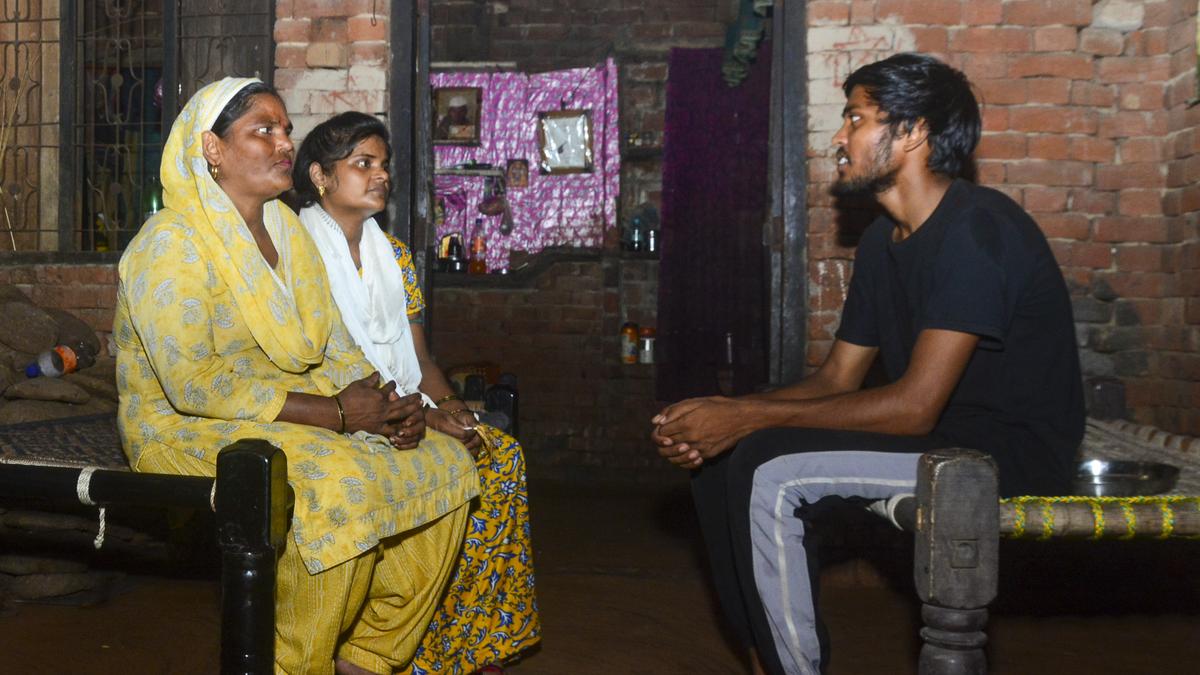The family members of Atul Kumar, who lost his hard-earned IIT Dhanbad seat after missing the deadline to deposit admission fees by a few minutes, at Titora village in U.P.’s Muzaffarnagar, Monday, September 30, 2024.
| Photo Credit: PTI
In one of the hundreds of modest un-plastered, bare-bricked homes in Muzaffarnagar’s Titora village, Tuesday morning was busy. The entire household was packing. In a matter of days, 18-year-old Atul Kumar, the youngest child of the household, will move to a hostel of the Indian Institute of Technology in Dhanbad.
The previous day, the Supreme Court had intervened and passed a direction to protect Atul’s seat at the premier engineering institute, paving the way for the confirmation of his admission. Three months ago, the JEE (Advanced) 2024 exam results had come, and Atul had secured a rank of 1455 in his category. Even though his family had arranged the ₹17,500 required to complete the process, the institute’s portal had closed by then.
“We were celebrating throughout on the way back home. I must thank the media, the court and the Chief Justice for bringing us justice,” said Atul’s father Rajendra, a Dalit daily-wage labourer who also works as a part-time tailor. “I am elated. Still as excited as I was yesterday when the Supreme Court’s decision came. I can’t wait to get to the campus,” Atul told The Hindu over the phone on Tuesday.
Both he and his father had come to New Delhi to hear the court deliver its judgement on Monday.
As the family got packing the following day, Atul said he was thinking about what to take and what to leave behind. His mother, Rajesh, said, “I have been thinking about what to send along with him. All I can think of is the food I know he likes.”

Rajendra was busy fielding calls from press persons and thanking well-wishers, many of whom were offering to pay for Atul’s tuition at IIT Dhanbad.
But amidst the happiness in the Kumar household about having “won a battle” with IIT’s “unfair” system, as Atul described it, his father was nervous about sending his boy out into the world of elite institutes, where complaints of abuse, and implicit and explicit ways of discrimination and social isolation are regular.
Rajendra, 46, grew up among the few hundred families of the Chamar community in Titora village, which is otherwise dominated by the Gurjar community. “I realise that things have changed since I was young but even now, I see in the media what happens to some students in big institutes,” he said.
Father to four sons, Rajendra has had the conversation about discrimination with his children as each of them left home to study, his eldest son getting the talk at 10 when he went to study at a Jawahar Navodaya Vidyalaya. “Don’t act on impulse and always come to me if there is ever even a hint of discrimination. Beyond this, the values are simple. I am teaching them to be good human beings,” he said.
“Once the formalities are over. I will be going to IIT Dhanbad with him, settling him in, meeting with some of his friends and maybe seniors and faculty too. This is most important,” Rajendra said. No matter the circumstances, he said he must “go to the ground” and check on his children wherever they are.
His eldest son is studying B.Tech at National Institute of Technology, Hamirpur, the second son is at IIT, Kharagpur, studying Chemical Engineering and the third son is a Hindi undergraduate student at the Sri Kund Kund Inter College in Khatauli, closer to home.
Atul, however, appears to be less worried and more focused on the course. “I am certain I will be able to study better at the hostel. Six other students I knew from the coaching centre have also secured seats there. I have been pining for this life ever since my brother inspired me,” he said.
Atul has kept his dream of going to the IIT alive while studying in between daily power cuts and doing household chores like collecting grass for the cattle. For the last leg of the preparation, he was at a free coaching centre in Kanpur, courtesy of the CSR initiative of a PSU. “I want to focus on exploring the first year of engineering so I can zero in on my interest area,” he said.
But the road to IIT Dhanbad was cleared only through directions of the Supreme Court, where Atul and his family reached after having gone through the National Commission for Scheduled Castes, the Jharkhand State Legal Services Authority and the Madras High Court over a period of three months after reaching a dead end trying to communicate their grievance to the institute. “Of course, it is an unfair system. If it was any humane institute, it would have asked me for an explanation as to why I am unable to submit the fees and hear the explanation. The whole thing would have been resolved,” Atul said.
Now, amid a flood of offers to pay for Atul’s education, Rajendra said he would prefer not to take any money if he can afford it. “I have always made tough decisions for the education of my children. We have about 1 to 1.5 bigha land that my forefathers had left me. That is on hold if any need arises at all,” he says. “So, I thank everyone who is offering but I would prefer exploring options of an education loan first.”
Rajendra had decided early on that he would find a way to educate his sons well, preferably in a private school, an option that was not available to him when he was growing up in the same village.
“Whatever I have read of Ambedkar has driven the importance of education into me and I found that with my sons I did not have to push much. Educating them well was the way to ensure their overall development at every level and so we put everything into it and I will continue to do so,” he said.
Published – October 01, 2024 10:32 pm IST






